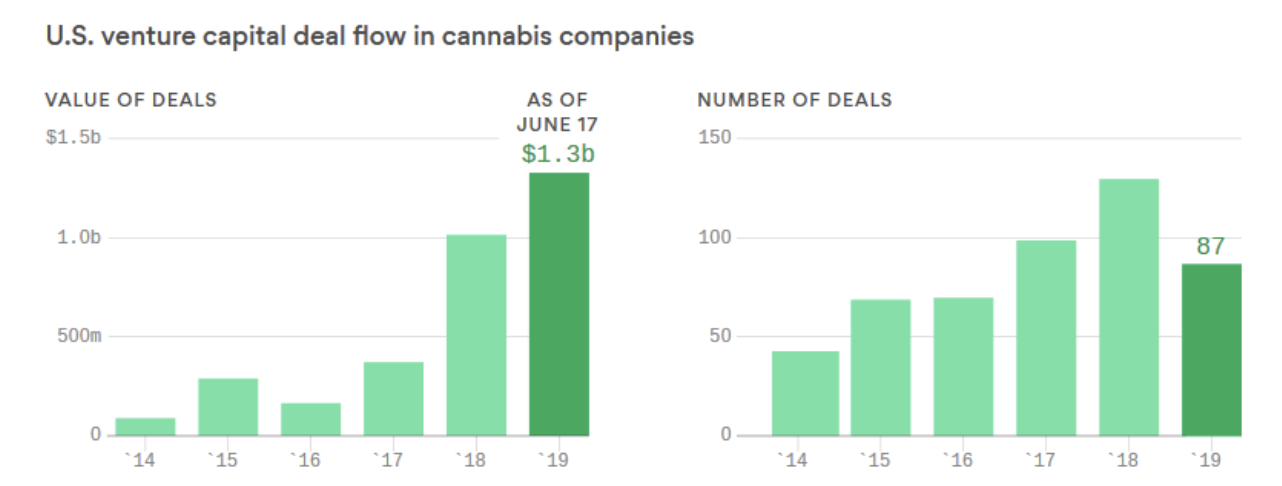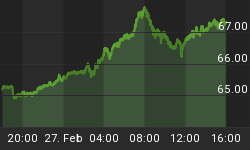With marijuana still classified as a Schedule I drug by the U.S. federal government, few institutional investors have been willing to write checks to cannabis companies. Despite the barriers, this hasn’t stopped the rise of a new clique of sector-specific firms that have a deep understanding of the nuances and challenges of investing in such a highly regulated and fragmented market.
The value of venture deals in the cannabis space has really taken off over the past few years, from a couple of hundred thousand bucks to billions of dollars currently.
PitchBook Data, a SaaS company that delivers data for private capital markets, started keeping tabs on the marijuana industry in 2012. Back then, the sector only recorded two VC deals worth a combined $300,000.
Fast forward to 2017 and venture capital funds flowing had multiplied more than a hundredfold to $378 million. A year later, the sector reached an important milestone with VC deals hitting the $1-billion mark.
Well, it just keeps getting better for the infantile industry. PitchBook has revealed that the sector has managed to garner $1.3 billion in VC investments through mid-June, an annual run-rate about 2.8x greater than the previous year’s.

(Click to enlarge)
Source: Axios
A double-edged sword
With the cannabis industry expected to enjoy impressive growth runways to hit $75 billion by 2030, such a speculative move appears justifiable.
Yet, the ongoing legalization drive across many parts of the globe is a catch 22, double-edged sword that could present both tailwinds and headwinds for these ambitious VC firms.
Related: Wall Street Is Finally Getting Behind Pot Stocks These cannabis-specific funds have mostly been raising money from private investors or family offices that have a higher risk appetite than your average pension fund. They tend to get into top startups before the heavy hitters can start throwing their weight around. Some of their investments are in actual weed growers while others are in adjacent businesses such as retail, finance, logistics and accessories that support the fledgling industry. Think of these investments as being akin to the difference between oil producers and supporting oilfield services.
But there’s no denying the inherent risk in their approach.
Whereas legalization is expected to open up the industry’s addressable market, to survive, these VC firms will have to be nimble enough to quickly adapt to a rapidly changing consumer and regulatory environment.
After all, why would marijuana companies need the services of specialized financial facilitators once everyday banks open up their doors? Or those of specialized logistics firms when traditional firms like FedEx are willing to play ball? Or even specialized retailers when neighborhood pharmacies and gas stations are selling the stuff?
Granted, some service brands are likely to survive even after the federal government finally grants the industry a carte blanche. After all, plenty of wine stores still exist in areas where wine is easily obtainable in supermarkets. Many though will surely disappear—a chilling prospect that’s likely to keep many potential investors on the sidelines. Related: Is Asia About To Create Its Own Common Currency?
As Tilray Inc.’s CEO Brendan Kennedy has admonished, as reported by Axios, "Investing for the short-term in specialized companies that become irrelevant after legalization has never made sense to me."
Legalization presents a major overhang for VC firms and investors looking to cut themselves a stake in young and promising marijuana startups.
Plenty of growth runways
Nevertheless, don’t let anyone fool you into thinking that these speculative investments will dry up any time soon. The explosive growth by the fledgling industry has won over even die-hard critics determined not to miss out on the next major leg up.
Notably, famous Wall Street short seller Andrew Left of Citron Research says he does not believe the industry is facing a bubble and even plans to create a marijuana fund.
Seems like everyone wants in, with hedge fund legend Leon Cooperman saying he’s investing in the industry.
Meanwhile, some of the hottest companies in the booming sector have gone on hiring sprees, an indication of how much competition has heated up in the industry.
Despite the impressive growth, VC investments in the weed sector are still relatively tiny—individual tech companies have done singular rounds greater than $1.3 billion. You can expect this figure to keep expanding despite the genuine risks that will accompany legalization.
For speculative investors, a caveat emptor is in order, with proper due diligence recommended.
By Alex Kimani for SafeHaven.com
More Top Reads From Safehaven.com:
















